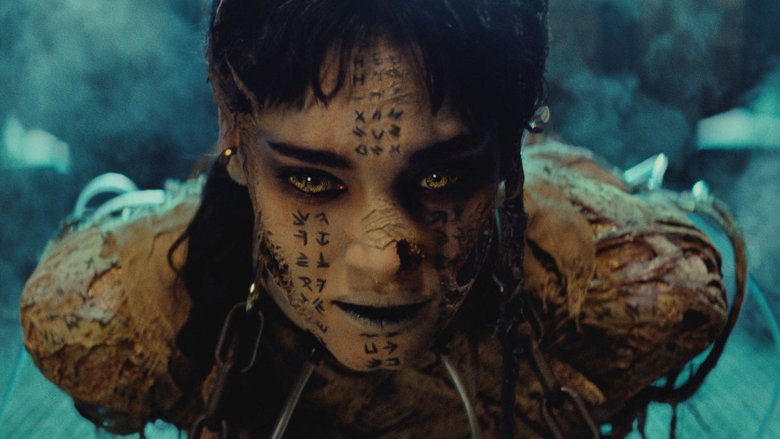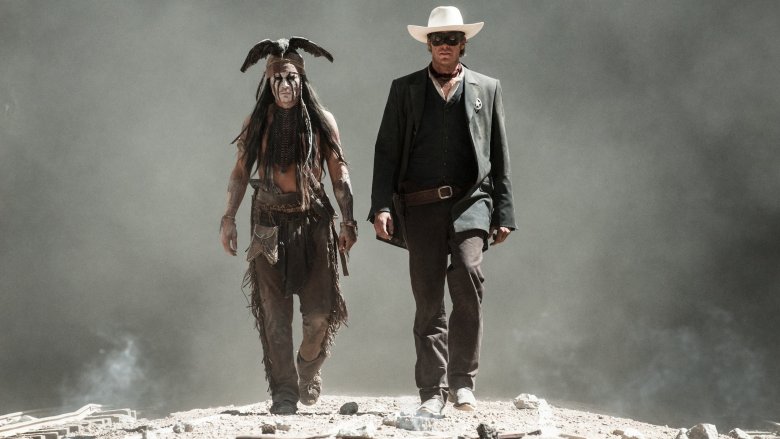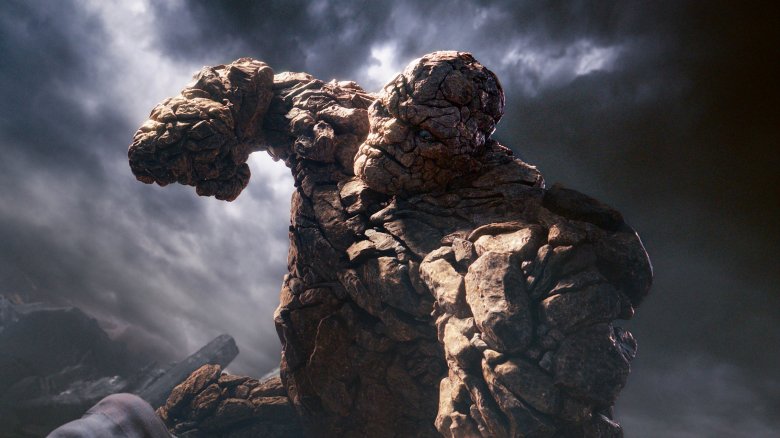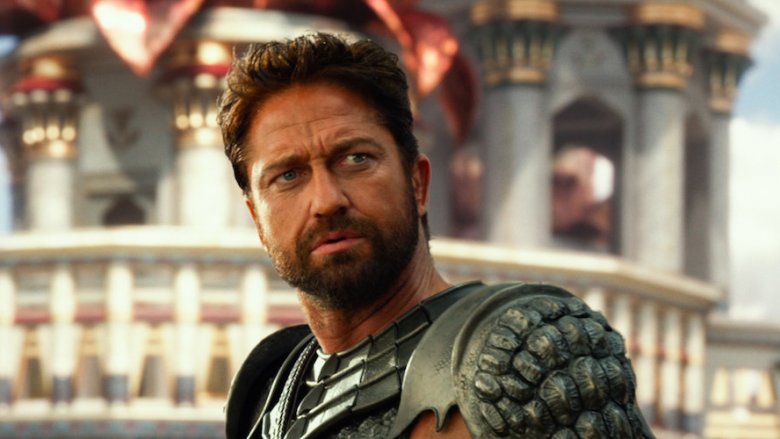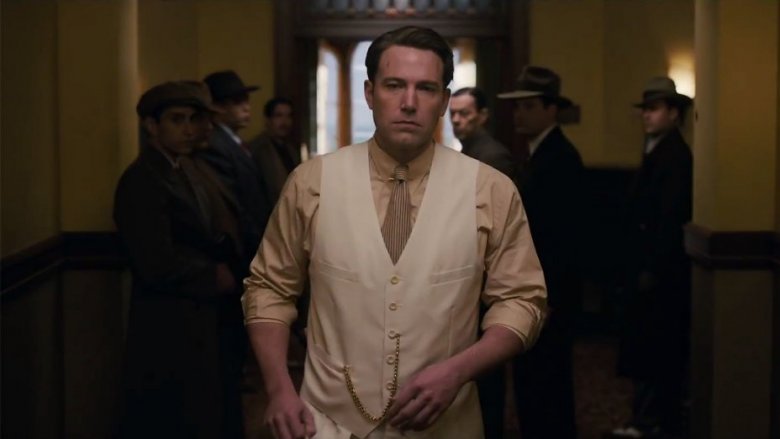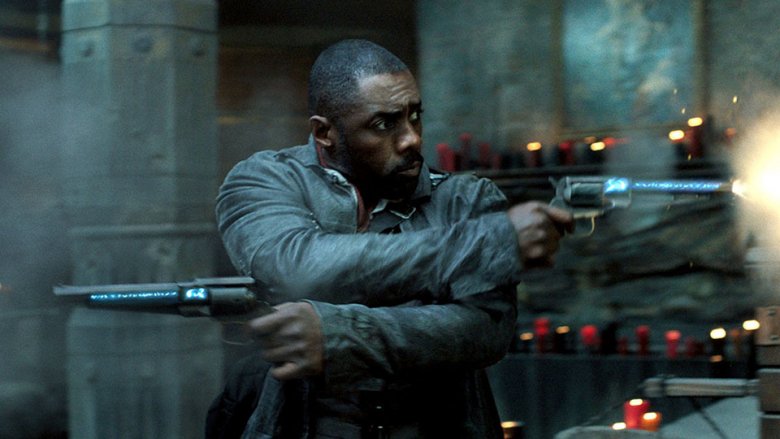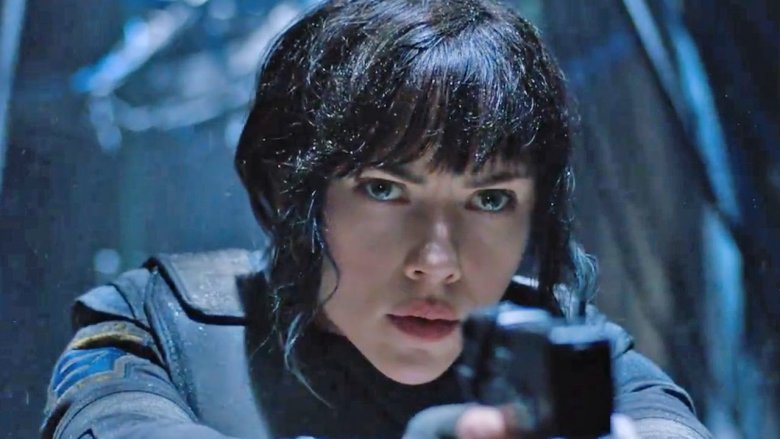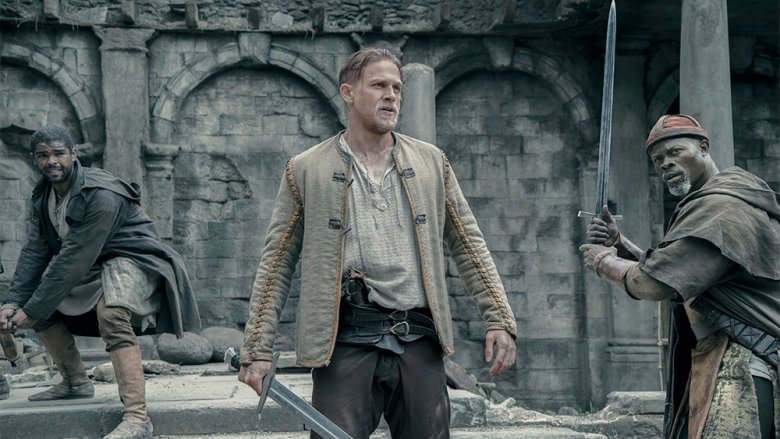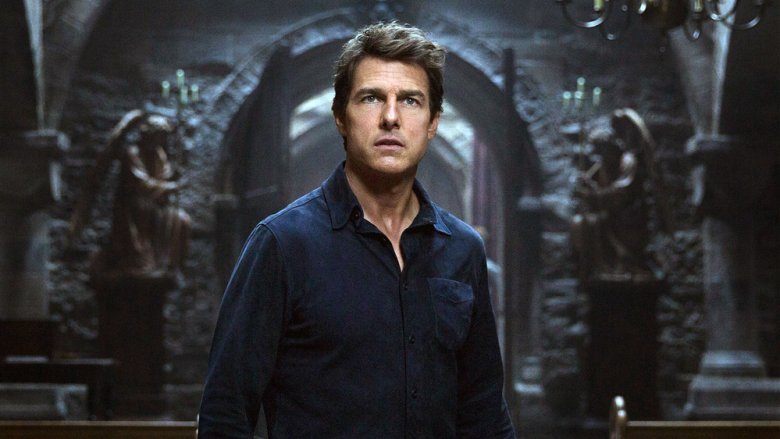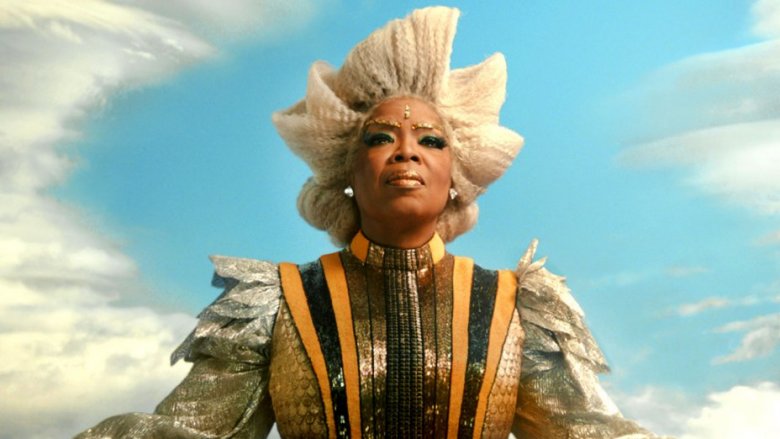Movies That Got Decimated By Terrible Rotten Tomatoes Scores
Movie studios have a love-hate relationship with Rotten Tomatoes. If the site says a movie is "fresh," they won't stop touting the rave reviews. (Just look at any trailer for Get Out or Lady Bird.) On the flip side, Hollywood executives often blame Rotten Tomatoes for declining ticket sales, especially when it comes to blockbusters. The argument goes that if audiences learn that a big-budget film is "rotten," then they'll stay home instead of spending their hard-earned cash on a poorly-reviewed movie.
So does Rotten Tomatoes actually influence moviegoers? Well, a study by USC's Entertainment Technology Center says no, but internal studies by Paramount and 20th Century Fox say yes, especially when it comes to millenials. In other words, it's a hotly contested topic.
However, it's probably safe to say that movies connected to well-established franchises are untouchable. People are going to watch Jurassic World movies and Fast and Furious films regardless of whether they're "fresh" or "rotten." But if we're talking about a standalone movie with no ties to a pre-established series, that's when Rotten Tomatoes might come into play. Just ask the folks behind these high-profile films failed to impress the critics — and got decimated by terrible Rotten Tomatoes scores.
The Lone Ranger gets run out of town
It took a whole lot of silver to make The Lone Ranger. This Walt Disney Western had a production budget of $215 million — and that's after production was halted and the studio forced the filmmakers to trim $45 million. (To put that into perspective, the production budget for Jurassic World was $150 million and the budget for Avatar was $237 million.) In other words, the House of Mouse really needed the Lone Ranger and Tonto to save the day.
Unfortunately, critics weren't kind to the masked man and his Comanche sidekick. While we think The Lone Ranger is actually a pretty ambitious movie with a lot going for it, the critics of 2013 tore it to pieces, giving the film a nasty 30 percent on Rotten Tomatoes. Worse still, the movie tanked at the box office, grossing $89 million domestically and $260 million worldwide. Factor in the marketing budget, and this movie was a total trainwreck.
Granted, there are probably a lot of reasons for The Lone Ranger's downfall, but if you ask the cast and crew, they'll blame it all on the bad reviews. Talking with Yahoo U.K.-Ireland (via Variety), producer Jerry Bruckheimer said that "in a few years," the critics would "see that they made a mistake." Johnny Depp claimed hateful critics wrote their reviews "seven to eight months before we released the film." But the angriest actor of all was Armie Hammer, who said the negative press "slit the jugular of our movie" before it ever rode onto the silver screen.
Fantastic Four is a fantastic failure
Before Fantastic Four even hit theaters in 2015, 20th Century Fox had already scheduled a sequel for June 2017. Sadly for the studio, this $120 million Marvel movie was doomed from the very beginning. Industry experts thought the film would earn a minimum of at least $35-$40 million on its opening weekend, but even that meager prediction was too much of a stretch. Instead, this thing got torched with a measly $25 million.
By the time it was all done, the movie had grossed a shocking $56 million domestically and $111 million internationally. To go with the obvious joke, the box office results were far less than fantastic. So what went wrong? Maybe it was the weird gritty tone? Perhaps it was because the movie was competing against Mission: Impossible – Rogue Nation? Or maybe it had something to do with its awful Rotten Tomatoes score.
Fantastic Four took an absolute beating from critics. The movie currently sits with a Rotten Tomatoes score of nine percent, making it the worst-reviewed Marvel film of all time. Critically speaking, it did worse than Ghost Rider, Ben Affleck's Daredevil, and even Howard the Duck. This supergroup isn't nearly as popular as the Avengers or the X-Men, so when casual audiences saw that abysmal nine percent, they probably decided to watch Tom Cruise do some spy stuff instead. And when Fantastic Four crashed and burned, it killed any chance of a sequel. But honestly, Marvel fans might want to thank Rotten Tomatoes because without those bad reviews, Michael B. Jordan might have never made it to Wakanda.
Gods of Egypt doesn't do so divine
Despite what you've heard, Gods of Egypt is actually a lot of fun. It's got giant cobras, epic battles, and Gerard Butler as an Egyptian god with a Scottish accent. However, when the movie rolled out in 2016, most critics tried their best to send this fantasy film to the underworld: Gods of Egypt earned a horrid 15 percent approval rating on Rotten Tomatoes, with critics attacking the film for its whitewashed cast, hammy acting, and lousy CGI.
And it seems the critical backlash kept audiences away from the ticket booth. The $140 million action flick grossed a domestic total of $31 million, and when you add the international box office, the movie walked away with a mere $150 million. That's especially sad since Lionsgate planned on turning Gods of Egypt into a franchise. Needless to say, both the studio and director Alex Proyas were heartbroken. In fact, Proyas was so upset that he went on a major Facebook rant, attacking film critics as "diseased vultures pecking at the bones of a dying carcass" and describing them as "less than worthless" because "they have no personal taste or opinion." Those are some pretty harsh words, but despite Proyas' screed, moviegoers still didn't have any faith in his film.
Live by Night dies at the box office
It's up for debate whether bad reviews can truly hurt a blockbuster, but when it comes to Oscar contenders, the critics are key to success. After all, nobody is going to nominate your movie if everybody says it sucks — which was bad news for Ben Affleck and his passion project, Live by Night.
The star-turned-director found critical success with three films back-to-back-to-back: Gone Baby Gone, The Town, and Argo. But when Live by Night roared onto the scene, booze flowing and tommy guns blazing, critics stuck the picture with a pair of cement shoes.
With Affleck as the lead (as well as the guy behind the camera), Live by Night told the tale of a moonshining mobster who goes toe-to-toe with the KKK. Despite its period piece potential, critics just weren't impressed. Owen Gleiberman called it "the ghost of a terrific movie," Brian Tallerico described it as "a footnote in the history of cinematic mob stories," and Matthew Lickona said it was "an American tale that mistakes muchness for greatness."
Combine all those negative reviews, and you get a 35 percent approval rating on Rotten Tomatoes. And it seems that green splotch kept people away during awards season, as Live by Night grossed $22 million worldwide against a $65 million budget. It's currently the lowest-grossing film of Affleck's career, and it reportedly lost $75 million for Warner Bros. So much for recapturing that Oscar-winning Argo magic.
Baywatch drowns in a sea of bad press
On paper, Baywatch sounds like a recipe for success: Put Dwayne Johnson and Zac Efron in an R-rated remake of a popular '90s TV show and make sure there's plenty of bare skin for everyone to admire. In theory, that should make all the money, but in reality, this lifeguard comedy drowned in a wave of negative reviews. Well, that's what Paramount executive Megan Colligan thinks anyway, as she told The Hollywood Reporter, "The reviews really hurt the film, which scored great in test screening."
And the reviews were really bad... like "David Hasselhoff trying to eat a cheeseburger" bad. The movie was swamped with a 17 percent on Rotten Tomatoes, and if Colligan is correct, the scathing reviews kept audiences at bay. Granted, there were plenty of other factors at play. The movie was up against Guardians of the Galaxy Vol. 2 and the fifth Pirates of the Caribbean movie. The R rating kept kids out, the raunchy tone probably alienated fans of the show, and casual audiences weren't really all that interested in watching a Baywatch movie in the first place.
And that's where the reviews come into play. If they'd been positive, maybe those moviegoers with no connection to the series would've given the film a shot. Instead, when the movie opened over the Memorial Day weekend, it earned around $26 million instead of the projected $40-$45 million (according to Forbes). By the time it was all said and done, the $69 million movie tanked with a domestic total of $58 million and a worldwide tally of $177 million. Those are hardly the kind of numbers you expect from Dwayne Johnson, but hey, if you throw the Rock into the ocean, chances are good he's going to sink.
The Dark Tower falls hard at the box office
For over ten years, Stephen King fans patiently waited for Roland Deschain and the Man in Black to battle it out on the big screen. And in 2017, their dark dreams finally came true. Starring Idris Elba and Matthew McConaughey, The Dark Tower was supposed to kickstart a major franchise, but the movie encountered quite a few road bumps before making it to theaters. It took forever for Sony Pictures to release a trailer, and the film was haunted by stories of behind-the-scenes struggles. Worse still, when the reviews started pouring in, it was clear the filmmakers had forgotten the faces of their fathers.
Critics blasted The Dark Tower to bits, and the fantasy-horror-Western earned a savage 16 percent on Rotten Tomatoes. Moviegoers who weren't diehard King fans were bound to be put off by that big green splotch, and with the aura of disaster hanging in the air, Variety predicted the film would earn somewhere between $20-$25 million on its opening weekend. However, the movie couldn't even match that staggeringly small figure. The Dark Tower only earned $19.5 million on its opening weekend before ending its domestic run with $50 million... against a $60 million budget.
Sure, it made $113 million worldwide, but Sony was hoping to set up sequels and a TV series. With those awful reviews and the bad box office, it seems that The Dark Tower has crumbled, crushing the hearts of Stephen King fans everywhere.
Ghost in the Shell gets whitewashed out of existence
Based on the 1995 anime, Ghost in the Shell was in trouble from the moment it cast Scarlett Johansson as Major Motoko Kusanagi. As soon as the news broke, people were furious (and rightly so). After all, why would Paramount cast a white actress as a Japanese cop when there were plenty of Asian actresses they could've picked? Combine the whitewashing controversy with the high regard for the original film, and there's really no way Ghost in the Shell was ever going to do that well at the box office.
Still, the trailers were impressive, and the movie looked gorgeous. Entertainment Weekly predicted the film would gross at least $30 million on its opening weekend, but when the Major sprang into action, the first three days resulted in a pathetic $18.6 million haul. Domestically, the movie would earn $40 million against its $110 million budget, prompting Paramount distribution chief Kyle Davies to blame the critics for taking the film down.
Speaking with the Canadian Broadcasting Corporation, Davies explained, "We had hopes for better results domestically. I think the conversation regarding casting impacted the reviews." Indeed, the Johansson scandal played a part in the film's negative reception, but that wasn't the only reason the movie was given a 43 percent on Rotten Tomatoes. The movie simply failed to hold its own against the original, both when it came to the story and the philosophical ideas that made the first film so poignant. And despite Johansson's star power, American audiences stayed far away, showing that even A-listers can't oppose the power of those tomatoes.
King Arthur: Legend of the Sword meets an ignoble fate
Directed by Guy Ritchie and starring Charlie Hunnam as the titular king, King Arthur: Legend of the Sword had a production budget of $175 million, but it was dethroned with a worldwide total of $148 million. Granted, there were a lot of factors at play in the coup of King Arthur, like the fact that it was competing against Guardians of the Galaxy Vol. 2, that it was a macho action flick released on Mother's Day, and that Jude Law was the only real star in the film.
But the critics didn't do the movie any favors. The movie was lambasted with bad reviews, and Legend of the Sword was given a legendarily bad Rotten Tomatoes score of 31 percent. (In fact, it was even lower when the film first opened.) In an era when old-timey IPs aren't faring so well at the box office, positive reviews might've lured more people into this world of monsters and mages. Instead, critics most likely encouraged people to hang out with Star-Lord instead of King Arthur, killing Warner Bros.' hopes of creating a King Arthur cinematic universe. It just goes to show that the critics' pen is truly mightier than the sword.
The Mummy gets wrapped up with bad reviews
Ever since The Avengers came along, movie studios have been desperately trying to start their own cinematic universes. Some have had more success than others — and then there's the cautionary tale of Universal's Dark Universe. The head honchos at Universal had it all planned out: There was going to be a Bride of Frankenstein film, an Invisible Man movie, and a flick featuring the Creature from the Black Lagoon. The series would star big names like Johnny Depp and Javier Bardem, but it all hinged on the success of The Mummy.
This 2017 action-horror hybrid had to scare audiences into theaters and make enough cash to prove the Dark Universe deserved to stand along the MCU and the DCEU. But instead of launching a new franchise, The Mummy got obliterated at the box office. Even Tom Cruise couldn't outrun the curses coming from the critics, with writer Rendy Jones summing it up best when he described the film as, "A poor start of a universe which idea is a better off in a tomb."
The movie was eventually marked with a 15 percent on Rotten Tomatoes, and the word online was that The Mummy was an absolute mess. Originally, the movie was predicted to gross $40 million opening domestically, but it fell far short with $31.6 million. Eventually, this creaky creature of a film made a wretched $80 million in the States against its $125 million budget. And while Cruise's charisma helped the movie fare better overseas, it was a bad start for what was supposed to launch an entire series. In fact, the movie was estimated to have lost around $95 million for Universal, and thanks to the bad reviews, this incarnation of the Dark Universe was staked in the heart before it could even really get going.
A Wrinkle in Time lacks that Disney magic
Based on the novel by Madeleine L'Engle, A Wrinkle in Time holds a special place in film history, as its director, Ava Duvernay, became the first black woman in Hollywood history to helm a live-action film with a budget over $100 million. And with stars like Oprah Winfrey, Chris Pine, Reese Witherspoon, and Mindy Kaling, the movie boasted serious talent both in front of and behind the camera.
Disney poured a lot of cash into promoting this movie, but it became clear there was something wrong when the studio refused to lift the review embargo until a day and a half before the film hit theaters. And once the reviews began pouring in, it became obvious why the House of Mouse was so eager to keep the critics away. Despite the studio's high hopes, A Wrinkle in Time wound up with a 42 percent approval rating on Rotten Tomatoes, and critics described the movie as both a "magical mystery tour minus the magic and mystery" and a film that had the "feel of an iPad video pawned off on a toddler."
And sure, A Wrinkle in Time is a classic book, but when it comes to popularity, it's no Hunger Games. So it was never a guaranteed fact that droves of people would show up based solely on their love of the novel. Solid reviews would've helped sell the film to audiences who weren't familiar with L'Engle's book, but instead, the movie fell apart in the theaters. The budget for the film has been estimated between $150-$250 million, but the movie only earned a worldwide total of $132.6 million, losing Disney somewhere between $86-$186 million — and adding an unfortunate wrinkle to Duvernay's impressive filmography.
